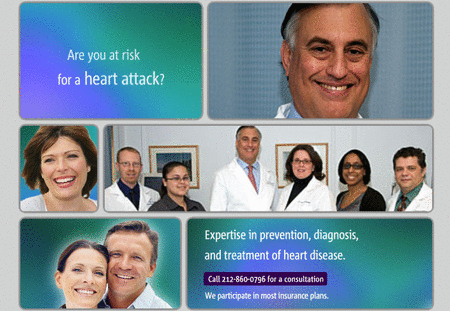The term heart disease indicates any medical condition that directly affects the functioning of heart.
Heart disease, depending upon their reason of occurrence, can be of three types:
Here’s a list of the major heart problems along with their treatment:
Disease of coronary artery:
It indicates the failure of coronary circulation to provide an adequate amount of oxygen-rich blood to the heart muscle. High levels of blood cholesterol, obesity, overweight, high blood pressure, smoking, stress, and physical inactivity are the major causes of these types of heart problems.
Treatment: Regular physical activity, quitting smoking and drinking, and eating a balanced diet are the first few steps to maintain a healthy heart.
If the problem has reached a more severe level then surgical procedure, called coronary angioplasty is advisable. Coronary stenting is another treatment performed by a heart specialist in NYC.
Cardiomyopathy:
Chronic heart disease, cardiomyopathy occurs when heart muscles get aberrantly stiffened and enlarged. According to the extent of abnormality of the heart muscles, cardiomyopathy can be of three types:
Treatment:
Cardiovascular diseases:
Such diseases occur due to problems in the vascular system, veins, and arteries that supply blood to the heart. Causes of cardiovascular disease are age, high cholesterol, obesity, smoking etc.
Treatment: General treatment for this heart conditions include:
Heart disease, depending upon their reason of occurrence, can be of three types:
- Heart problems due to high blood pressure
- Heart problems due to (CAD) coronary artery disease
- Certain other issues due to infection
Disease of coronary artery:
It indicates the failure of coronary circulation to provide an adequate amount of oxygen-rich blood to the heart muscle. High levels of blood cholesterol, obesity, overweight, high blood pressure, smoking, stress, and physical inactivity are the major causes of these types of heart problems.
Treatment: Regular physical activity, quitting smoking and drinking, and eating a balanced diet are the first few steps to maintain a healthy heart.
If the problem has reached a more severe level then surgical procedure, called coronary angioplasty is advisable. Coronary stenting is another treatment performed by a heart specialist in NYC.
Cardiomyopathy:
Chronic heart disease, cardiomyopathy occurs when heart muscles get aberrantly stiffened and enlarged. According to the extent of abnormality of the heart muscles, cardiomyopathy can be of three types:
- Dilated cardiomyopathy: occurs when heart muscle (myocardium) get weak and enlarged.
- Hypertrophic cardiomyopathy: occurs when heart muscles get thicker than normal.
- Restrictive cardiomyopathy: occurs when heart stiffens and heart chamber cannot efficiently fill with blood during diastole.
- The selection of treatment for this disease highly depends upon age, type, and severity of cardiomyopathy, general health status, and other factors.
- A heart doctor can prescribe appropriate medicines to regulate the heart and preventing the development of clots.
Such diseases occur due to problems in the vascular system, veins, and arteries that supply blood to the heart. Causes of cardiovascular disease are age, high cholesterol, obesity, smoking etc.
Treatment: General treatment for this heart conditions include:
- Eating a diet with less fat content
- Regular physical activity
- Avoid unnecessary stress because it directly causes high blood pressure
- Timely check-up for blood pressure and addressing the situation, as needed.




